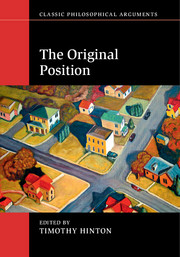Book contents
- Frontmatter
- Contents
- List of contributors
- Acknowledgments
- List of abbreviations
- Introduction: the original position and The Original Position – an overview
- 1 Justice as fairness, utilitarianism, and mixed conceptions
- 2 Rational choice and the original position: the (many) models of Rawls and Harsanyi
- 3 The strains of commitment
- 4 Our talents, our histories, ourselves: Nozick on the original position argument
- 5 Rawls and Dworkin on hypothetical reasoning
- 6 Feminist receptions of the original position
- 7 G. A. Cohen's critique of the original position
- 8 Liberals, radicals, and the original position
- 9 The original position and Scanlon's contractualism
- 10 The “Kantian roots” of the original position
- 11 Stability and the original position from Theory to Political Liberalism
- 12 The original position in The Law of Peoples
- References
- Index
4 - Our talents, our histories, ourselves: Nozick on the original position argument
Published online by Cambridge University Press: 05 December 2015
- Frontmatter
- Contents
- List of contributors
- Acknowledgments
- List of abbreviations
- Introduction: the original position and The Original Position – an overview
- 1 Justice as fairness, utilitarianism, and mixed conceptions
- 2 Rational choice and the original position: the (many) models of Rawls and Harsanyi
- 3 The strains of commitment
- 4 Our talents, our histories, ourselves: Nozick on the original position argument
- 5 Rawls and Dworkin on hypothetical reasoning
- 6 Feminist receptions of the original position
- 7 G. A. Cohen's critique of the original position
- 8 Liberals, radicals, and the original position
- 9 The original position and Scanlon's contractualism
- 10 The “Kantian roots” of the original position
- 11 Stability and the original position from Theory to Political Liberalism
- 12 The original position in The Law of Peoples
- References
- Index
Summary
In considering how society should be structured, in particular how social institutions that fundamentally shape our life prospects should be arranged, what facts about people should we take into account? In drafting the principles governing those basic institutions, should we consider how talented people are, their sex or race, or other variable contingencies about them? If we do, we may well structure those principles in ways that favor certain groups, such as those with more natural talent, or those whose race, gender, or social identity are dominant in the power structure of society. But would that be fair? Rawls's original position procedure is a representational device to construct a negative answer to that question and thereby determine the principles that shape basic social institutions in ways that abstract from those contingencies.
Robert Nozick objected to many aspects of this procedure, and he did so as a defender of libertarian political philosophy. Nozick produced, in fact, the most developed and nuanced defense of that libertarian vision that we have. And for a good while after TJ and ASU were published, much of the discussion of distributive justice centered on the conflict between these two theories.
And while much of the commentary on this debate critically analyzed the two theories themselves, either separately or together, less attention was paid to Nozick's objections to the original position specifically. Of course, since the original position is so central to Rawls's theory, especially in TJ, any discussion of the two thinkers contained implications for the plausibility of the original position argument and, by extension, the questions Nozick raised about it. In that light, I want to discuss some of the representative themes in Nozick's critique and consider how well the original position holds up against them. While libertarianism no longer holds the broad appeal in the philosophical world it once did, Nozick's objections are still trenchant and interesting.
In the end, I will suggest that Nozick's critique fails, but not exactly for the reasons discussed by the commentators I mention (though for closely related reasons). Indeed, I want to argue that Rawls's claims motivating the design of the original position can be seen as consistent with Nozick's own view when we look at the principle of rectification he offers as a palliative to the ubiquitous injustices that we know mark the history and current practices of most (all?) societies.
- Type
- Chapter
- Information
- The Original Position , pp. 77 - 96Publisher: Cambridge University PressPrint publication year: 2015
- 1
- Cited by

